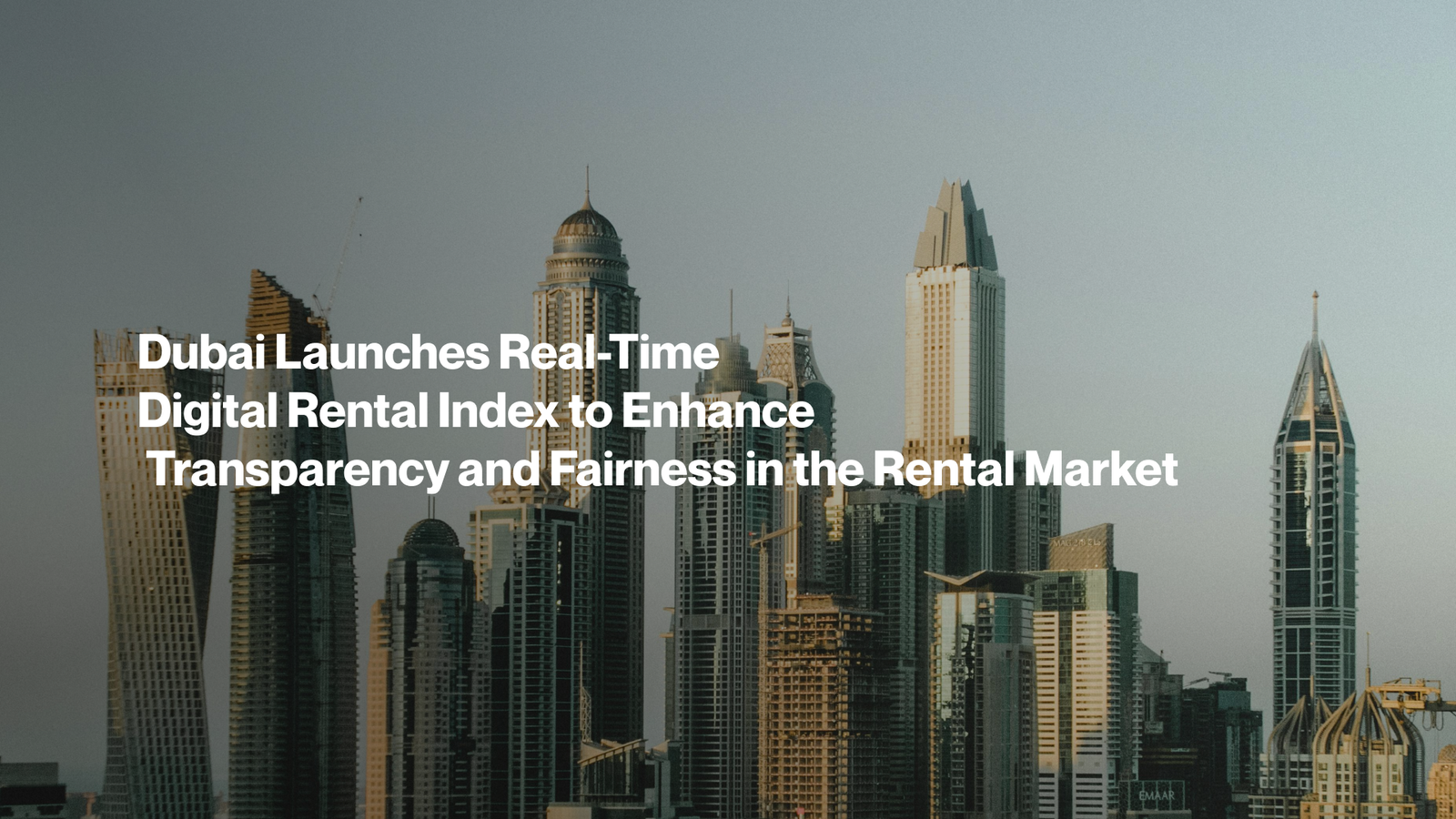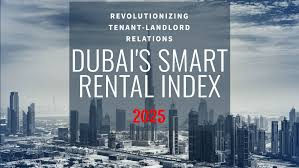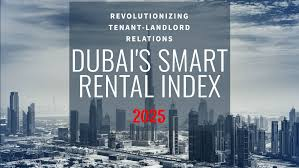Now Reading: Dubai’s Digital Rental Index 2025: Enhancing Transparency in the Rental Market
-
01
Dubai’s Digital Rental Index 2025: Enhancing Transparency in the Rental Market
Dubai’s Digital Rental Index 2025: Enhancing Transparency in the Rental Market

Table of Contents
Dubai’s Digital Rental Index 2025: The Smart Rental Index 2025, launched by the Dubai Land Department (DLD) on January 2, 2025, marks a transformative step in regulating Dubai’s dynamic rental market. Replacing the Real Estate Regulatory Agency (RERA) Rental Increase Calculator, this AI-powered, data-driven tool enhances transparency, fosters trust, and ensures fair rental valuations for tenants, landlords, and investors across residential areas, including key districts, special development zones, and Free Zones.
By integrating advanced technologies like artificial intelligence (AI), big data analytics, and blockchain, the index aligns with Dubai’s Digital Strategy and Real Estate Sector Strategy 2033, reinforcing the emirate’s position as a global real estate hub. Below is a detailed analysis of the Smart Rental Index 2025, its features, benefits, and implications for Dubai’s rental market, with connections to the luxury real estate trends and taxation frameworks discussed previously.
Key Features of the Smart Rental Index 2025

- AI-Driven Valuation System:
- The index leverages AI and big data to provide real-time rental valuations, analyzing over 60 criteria, including:
- Technical and Structural Characteristics: Construction quality and materials.
- Finishes and Maintenance: Standards of property upkeep.
- Location and Spatial Value: Proximity to key areas, landmarks, and transport.
- Services and Amenities: Availability of maintenance, cleanliness, parking, gyms, and pools.
- This replaces the RERA calculator’s broad, neighborhood-based averages, which often failed to capture micro-market variations (e.g., differences in building quality within Dubai Marina).
- Building Classification System:
- Properties are rated on a one-to-five-star scale based on the above criteria, determining permissible rent increases. Higher-rated buildings (e.g., luxury residences in Palm Jumeirah with premium amenities) can justify higher rents, while older properties may face tighter caps unless upgraded.
- Example: A five-star building in Downtown Dubai with smart home features and concierge services may command premium rents, while a three-star property in Al Nahda may see limited increases.
- Real-Time Data Updates:
- Unlike the RERA index, updated annually or quarterly (last revised in April 2024), the Smart Rental Index provides dynamic, real-time updates, reflecting market changes instantly. Data sources include rental contracts, property portals, utility bills, and short-term rental platforms like Airbnb.
- This ensures valuations align with current trends, such as the 18% surge in short-term rental demand and 13% increase in long-term leases noted in 2025 luxury market trends.
- Structured Rent Increase Framework:
- Governed by Decree No. (34) of 2013, rent increases are capped based on the difference between a property’s current rent and the market average:
- Landlords must provide a 90-day notice for rent increases, and the index applies to contract renewals in 2025. If a contract was renewed before 2025, the previous RERA index applies.
- Accessibility and Integration:
- The index is accessible via the Dubai REST app, allowing seamless contract management (registration, renewal, cancellation) and access to rental valuations by entering an Ejari number.
- Features include a tenant classification system, providing credit ratings and financial reports through the Ejari system, adding transparency for landlords selecting tenants.
- Future Expansion:
- The DLD plans to extend the index to cover commercial and industrial properties, introduce predictive analytics for rental trends, and offer training programs, specialized customer service, and multi-channel support to enhance user experience.
Benefits for Stakeholders

- Tenants:
- Fair Pricing: Transparent valuations prevent overcharging, empowering tenants to negotiate confidently, especially in high-demand areas like Dubai Marina or Downtown Dubai, where luxury rentals are prevalent.
- Informed Decisions: Real-time data helps tenants select properties aligned with market rates, reducing disputes. For example, tenants in Jumeirah Lakes Towers (JLT) can verify if a AED 9,500/month short-term rental is fair.
- Protection: The structured rent increase caps protect against arbitrary hikes, critical in a market with 13% long-term and 18% short-term rental growth.
- Luxury Context: Tenants seeking luxury rentals (e.g., branded residences like Mira Villas by Bentley) benefit from clear pricing, aligning with preferences for high-end amenities noted in the luxury real estate analysis.
- Landlords:
- Justified Pricing: Accurate data enables landlords to set competitive rents, maximizing ROI, particularly for luxury properties in Palm Jumeirah (36% ROI) or Dubai Hills Estate (41% ROI).
- Property Upgrades: The star-rating system incentivizes maintenance and renovations to achieve higher ratings and justify rent increases, aligning with buyer preferences for smart, sustainable properties.
- Tax Compliance: As noted in the VAT and corporate tax discussions, landlords must charge 5% VAT on short-term rentals (e.g., Airbnb in Business Bay) and register for corporate tax (9% on income above AED 375,000) if applicable, using index data to ensure compliance.
- Investors:
- Market Insights: Real-time data and predictive analytics highlight high-yield areas (e.g., Dubai Marina with 84% ROI), supporting Golden Visa-driven investments (AED 2 million threshold).
- Transparency: The index reduces investment risks by providing reliable valuations, fostering confidence in Dubai’s 6–9% rental yield market, as seen in luxury trends.
- Tax Benefits: Investors in Free Zones like DMCC benefit from 0% corporate tax on qualifying income, while VAT exemptions on residential leases enhance returns, as discussed in prior VAT and tax overviews.
- Market Stability:
- The index mitigates inflation by regulating rent increases, maintaining Dubai’s balanced cost of living despite a projected 18% short-term rental surge.
- Over 900,000 rental contracts were registered in 2024, an 8% increase from 2023, reflecting growing market confidence.
Implications for Dubai’s Rental Market

- Enhanced Transparency and Trust:
- The index addresses historical issues with the RERA calculator, such as outdated data and lack of hyperlocal insights, reducing disputes and aligning valuations with actual market conditions.
- Tenants in luxury areas like Downtown Dubai benefit from clear pricing, while landlords can justify premium rents for high-rated properties, fostering trust.
- Support for Luxury Real Estate:
- The index complements the luxury market’s 5–10% price growth and 6–9% yields by ensuring fair valuations for branded residences and smart homes in areas like Palm Jumeirah.
- Golden Visa investors (targeting AED 2 million properties) benefit from transparent rental data, supporting investment decisions in high-ROI areas like Dubai Marina.
- Tax and Compliance Integration:
- VAT: Landlords offering short-term luxury rentals (e.g., serviced apartments in JLT) must charge 5% VAT and adopt eInvoicing (proposed for 2025), using index data to ensure accurate invoicing.
- Corporate Tax: Freelancers and landlords with income above AED 375,000 face a 9% corporate tax, requiring registration by March 31, 2025. The index’s data supports compliance by providing clear rental income insights.
- Free Zone landlords (e.g., DMCC) can leverage 0% tax on qualifying income, but mainland luxury rentals are taxable, necessitating precise financial tracking.
- Market Stability and Growth:
- By curbing arbitrary rent hikes, the index stabilizes the market, supporting Dubai’s 6.2% GDP growth forecast and 2040 Urban Master Plan goals.
- The index’s expansion to commercial properties will further enhance transparency, benefiting investors in mixed-use developments like Business Bay.
- Challenges:
- Adjustment Period: Landlords accustomed to the RERA system may find the 11-indicator, star-based system complex.
- Tech Dependency: Small landlords with limited digital literacy may face barriers, requiring DLD training programs.
- Older Properties: Landlords with lower-rated buildings may face tighter rent caps, necessitating upgrades to compete with luxury properties.
Overview
Launched by the Dubai Land Department (DLD) on January 2, 2025, the Smart Rental Index replaces the RERA calculator, using AI, big data, and blockchain to provide real-time rental valuations. Covering all residential areas, including Free Zones, it aligns with Dubai’s Digital Strategy and Real Estate Sector Strategy 2033, enhancing transparency and fairness.
Key Features
- AI-Driven Valuations: Analyzes over 60 criteria (structural quality, finishes, location, amenities) for accurate pricing.
- Building Classification: One-to-five-star ratings determine rent increases based on property quality.
- Real-Time Updates: Uses data from contracts, portals, and Airbnb for dynamic valuations, unlike RERA’s annual updates.
- Rent Increase Caps (Decree No. 34 of 2013):
- 0% if rent <10% below market average.
- 5% if 11–20% below.
- 10% if 21–30% below.
- 15% if 31–40% below.
- 20% if >40% below.
- Accessibility: Available via Dubai REST app; includes tenant credit ratings via Ejari.
- Future Plans: Expansion to commercial/industrial properties, predictive analytics, and training programs.
Benefits
- Tenants: Transparent pricing prevents overcharging; caps protect against hikes (e.g., 13% long-term, 18% short-term rental growth).
- Landlords: Data-driven pricing maximizes ROI; upgrades boost ratings for luxury properties (e.g., Palm Jumeirah).
- Investors: Real-time insights support Golden Visa investments (AED 2M threshold) with 6–9% yields.
- Market Stability: Mitigates inflation, supports 8% contract growth (900,000 in 2024).
Implications
- Luxury Market: Supports fair valuations for branded residences and smart homes in Downtown Dubai, Dubai Marina.
- Tax Compliance:
- 5% VAT on short-term rentals; eInvoicing proposed for 2025.
- 9% corporate tax on income >AED 375,000; Free Zone exemptions apply.
- Challenges: Complex system for landlords; tech barriers for small operators; older properties face tighter caps.
Recommendations
- Tenants: Use Dubai REST app to verify rental rates; negotiate based on index data.
- Landlords: Upgrade properties for higher ratings; comply with VAT and corporate tax rules.
- Investors: Target high-yield areas (e.g., Dubai Marina, 84% ROI) using index insights.
- Stay Informed: Monitor DLD updates (www.dubailand.gov.ae) for commercial index expansion and training.
Resources
- Dubai Land Department: www.dubailand.gov.ae
- Dubai REST App: Contract management and index access
- FTA (Tax Compliance): www.tax.gov.ae
Conclusion
The Smart Rental Index 2025 revolutionizes Dubai’s rental market by providing AI-driven, real-time valuations, enhancing transparency, and ensuring fairness for tenants, landlords, and investors. With a star-based classification system and structured rent increase caps, it addresses the 13–18% rental growth noted in luxury market trends while supporting Golden Visa-driven investments.
Stakeholders must navigate VAT (5% on short-term rentals) and corporate tax (9% above AED 375,000) compliance, using index data to optimize pricing and returns. Despite challenges for small landlords, the index strengthens Dubai’s position as a global real estate leader, aligning with the 2040 Urban Master Plan and Digital Strategy. For more details, visit www.dubailand.gov.ae or consult experts like Provident Estate or DAMAC Properties.
WATCH MORE: https://www.youtube.com/watch?v=AK7aG77XyZc
READ MORE: Luxury Real Estate in Dubai: Trends and Buyer Preferences in 2025






















